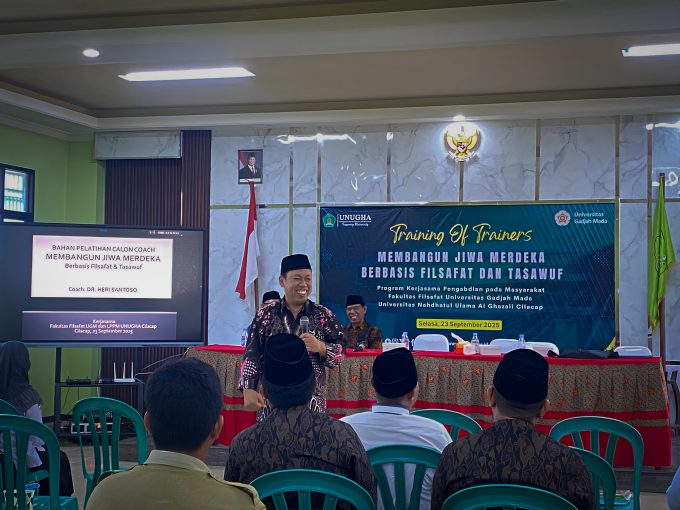
The Faculty of Philosophy at Universitas Gadjah Mada (UGM), in collaboration with Universitas Nahdlatul Ulama Al-Ghazali (UNUGHA) Cilacap, held a Training of Trainer (ToT) program on Coaching for Building a Free Spirit on Wednesday (Sept 24) in Cilacap.
In his introduction, Drs. Imam Wahyudi, M.Hum., emphasized the importance of developing coaching methods that are not solely rooted in Western paradigms, but also grounded in Nusantara intellectual heritage and Islamic traditions. The concept was initiated by Dr. Heri Santoso, who encouraged participants to take a path of olah rasa (refining inner sensitivity) through a balance of intellectual reflection and spiritual experience.
“We can engage in dialogue with God through the recitation of Al-Fatihah, contemplation of the Qur’an, appreciation of Asmaul Husna, and the sharpening of conscience as a way to find both the roots and solutions to life’s problems,” explained Heri.
The method’s justification was strengthened by Dr. KH Abdul Malik Usman, M.Si., who asserted that using Al-Fatihah, the Qur’an, Asmaul Husna, and conscience does not contradict Islam or Sufism. On the contrary, he stressed that such practices have long been the path of scholars in addressing life’s challenges.
“Al-Fatihah is the password to enter the Qur’an. The Qur’an is God’s book revealed for humanity, to resolve all life’s problems. Asmaul Husna is our means of knowing God and drawing closer to Him, while conscience is God’s gift that captures divine light,” he explained. Echoing this, KH Fahrur Rozi, M.Fil., cited examples of healing practices by scholars through water, writing, and Qur’anic recitation as authentic demonstrations of spiritual power.
The training offered a comprehensive experience to around forty participants, including teachers, lecturers, and educators from various institutions. Post-event surveys revealed that most participants found the method highly relevant to character development in education. Many testimonies highlighted how the approach reshaped their understanding of freedom—not merely freedom of action, but inner freedom aligned with divine values.
The integration of philosophy and Sufism was seen as a bridge between critical reasoning and spiritual remembrance (dzikir). The practice of olah rasa through Al-Fatihah, Asmaul Husna, and conscience was considered a practical way to identify root problems without exposing personal secrets. Some participants even reported profound spiritual experiences, moments they believed were manifestations of God’s power.
The presence of UNUGHA leaders, including Dr. H. Lumaurridlo, S.Psi., M.Pd. and KH. Lubbul Umam, ME., underscored institutional support for educational models that balance intellectual freedom with spiritual maturity. This approach provides educators with renewed energy to guide students into becoming truly free individuals—not only in thought, but also in heart and behavior.
Through this program, philosophy and Sufism were presented not as separate paths but as complementary ones—illuminating the mind, softening the heart, and preparing a generation that is intellectually, ethically, and spiritually free. The ToT thus stands as tangible proof of UGM’s commitment to advancing higher education innovations rooted in both local wisdom and universal values, relevant to modern challenges while faithful to tradition.
